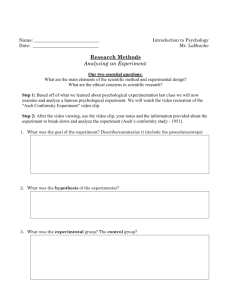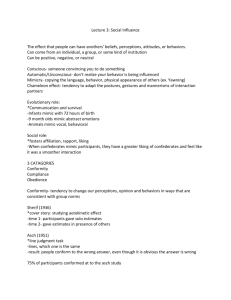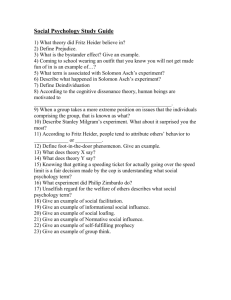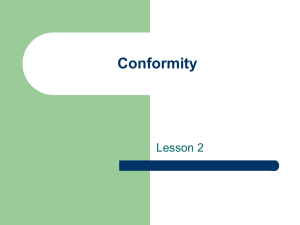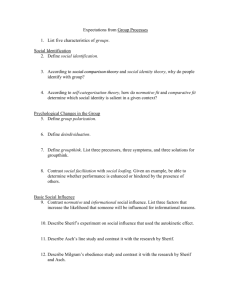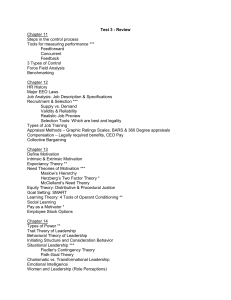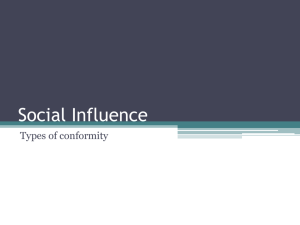rhetorical_analysis_revised
advertisement
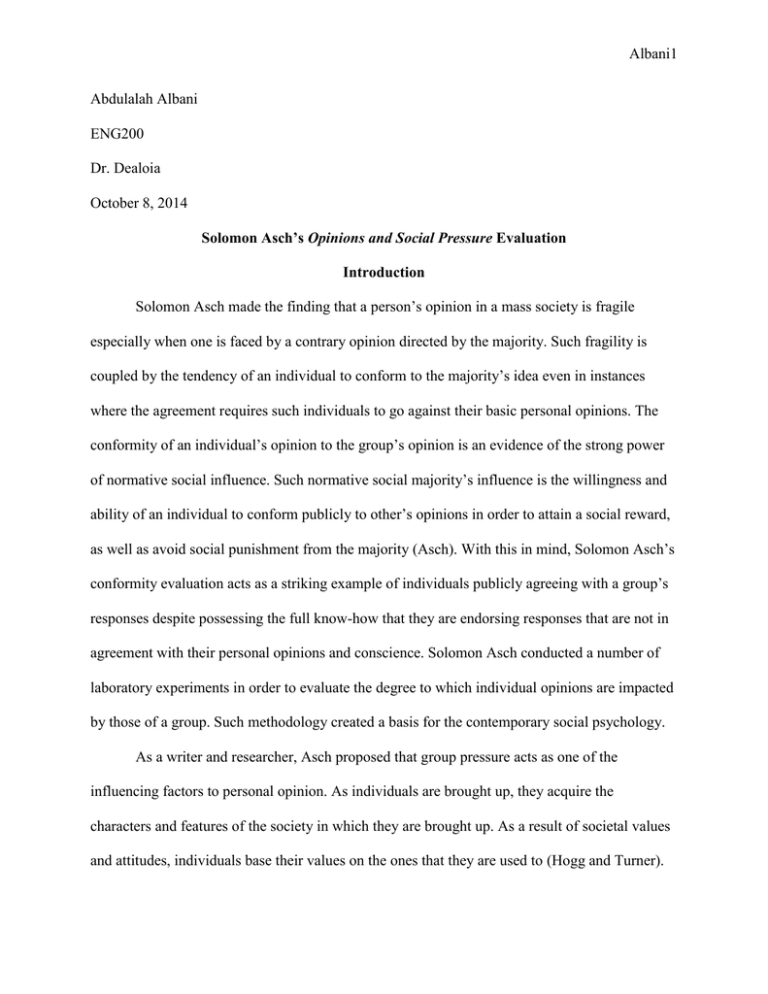
Albani1 Abdulalah Albani ENG200 Dr. Dealoia October 8, 2014 Solomon Asch’s Opinions and Social Pressure Evaluation Introduction Solomon Asch made the finding that a person’s opinion in a mass society is fragile especially when one is faced by a contrary opinion directed by the majority. Such fragility is coupled by the tendency of an individual to conform to the majority’s idea even in instances where the agreement requires such individuals to go against their basic personal opinions. The conformity of an individual’s opinion to the group’s opinion is an evidence of the strong power of normative social influence. Such normative social majority’s influence is the willingness and ability of an individual to conform publicly to other’s opinions in order to attain a social reward, as well as avoid social punishment from the majority (Asch). With this in mind, Solomon Asch’s conformity evaluation acts as a striking example of individuals publicly agreeing with a group’s responses despite possessing the full know-how that they are endorsing responses that are not in agreement with their personal opinions and conscience. Solomon Asch conducted a number of laboratory experiments in order to evaluate the degree to which individual opinions are impacted by those of a group. Such methodology created a basis for the contemporary social psychology. As a writer and researcher, Asch proposed that group pressure acts as one of the influencing factors to personal opinion. As individuals are brought up, they acquire the characters and features of the society in which they are brought up. As a result of societal values and attitudes, individuals base their values on the ones that they are used to (Hogg and Turner). Albani2 The practices of the community have adequate pressure to a wide range of questions that individuals would investigate in later stages in life (Perrin and Spencer). As proposed by psychologists, a child views what is practiced in their society as all proper and fitting. In the study of the influence of public opinion towards personal opinion, Asch made the main assumption that the operations of public opinion and propaganda are a common account in the contemporary life. People are known to submit painlessly and uncritically to public manipulation through prestige, as well as well as suggestion. Additionally, any given value in an individual’s life cannot be expressed without the agreement with public opinion. Individuals tend to be skeptical to go against the public opinion (Perrin and Spencer). It is n this regard that Asch argued that the power of public pressure leads to uncritical submission to the capacity and dependence on social agreement. “It is thus, common to human beings to reduce repellence towards group suggestions and passion.” Furthermore, on psychological grounds, it is possible for a group to change an individual’s judgment concerning a given subject by adjusting their assumptions and belief concerning such subjects. Such influence of group opinion is influenced by a wide range of aspects. Additionally, in situations where the dissenter chooses a view that is more different as compared to the standard one, the main results portray a different idea. As provided by Asch, the extremist dissenter provides a remarkable differentiation from the group’s proposal with errors dropping as the number of opposing sides reduce (Asch). However, all the errors offered by an individual are usually of moderate variety in instances where the size of the opposition reduces. It is possible to conclude that dissent per se raises independence, as well as moderates the errors made by an individual and as such, the direction of difference exerts repugnant impacts (Sherif and Sherif). Albani3 In fact, in all the experiments carried out by Asch, each of the research individuals had originated from a single setting. As such, the impacts upon a specific individual concerning a change in the circumstances that they were brought up in are usually conforming to the values and attitudes depicted by such individuals in their local settings. In situations where individuals are changed from their local environment, they still depict conformity with group performance. It is surprising that the experience that an individual has in majority opposition does not influence their current status. Questioning persons in the current circumstances depicts that they have an influence of their past. The specificity of the settings in which persons were brought up acts as a differing factor when it comes to group influence (Perrin and Spencer). Additionally, psychologists suggest that people tend to conform to the specifications of the settings in which they were brought up. In this respect, an individual’s impact on group influence outlasts their current situations. An individual’s current positions on specific aspects are also influenced by the number of supporters that they have. Individuals tend to break away from group influence in instances where they have a large number of supporters (Hogg and Turner). So long as such supporters stay by the side of their subjects, the individual remains unanimously in their position that is related to their supporters’ one though different from that of the group. Conclusion As might be expected, an individual is obligated to their personal opinion and they cannot be swayed to group proposals and influence. It is in this regard that people tend to support their opinions in the absence of group influence. However, it is important to note that group influence leads to deflection of personal direction as individuals tend to conform to the majority, which Albani4 was a great observation by Solomon Asch. As provided by Asch, a personal opinion is usually independent with the presence of personal conscience and self. However, group influence tends to be a great influencing factor to personal opinion. Albani5 References Asch, S. Effects of group pressure upon the modification and distortion of judgment. Pittsburgh, PA: Carnegie Press, 1951. Hogg, M. A and J Turner. Social identity and conformity: A theory of referent informational influence. Cambridge: Cambridge University Press, 1987. Perrin, S and C Spencer. "The Asch effect: a child of its time?" Bulletin of the British Psychological Society 32 (1980): 405-406. Sherif, M and C Sherif. Groups in harmony and tension. New York: Harper & Row, 1953.
